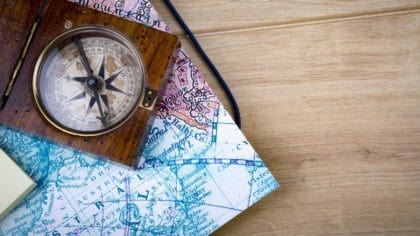Everyone likes going on holiday, especially if you’re lucky enough to go to another country!
But however much we like holidays, whether at home or abroad, travel and tourism can be harmful to the environment.
- Whilst airplanes are great for getting you to far-away places, their engines release carbon dioxide and other greenhouse gases into the atmosphere, which contribute to global warming
- Ferries can spill oil into the water which harms animal and plant life
- And if you drive, your car exhaust releases harmful carbon gases
But it’s not just travelling to holiday destinations that can be harmful to the environment, it’s also important to respect the local environment of the countries we visit, so that we don’t ruin it for the locals or future visitors.
For example, if you go snorkelling, you should never touch coral. This is because coral is very delicate and if lots of tourists touch it whilst snorkelling, it can get damaged very quickly.
Coral doesn’t just look pretty; coral reefs play an important role in helping keep the sea off the land, as well as providing homes to a lot of sea animals. And it can’t do its job sitting in your bag!
What Can We Do?
Although airplanes are bad for the environment, it’s tricky not to use them if you want to go on holiday to a far away country. That’s why lots of airlines and travel agents now offer something called ‘carbon offsetting’ where you pay a little bit extra for your flight in order to fund environmental projects designed to fight climate change.
When you’re on holiday, remember that you are a guest in someone else’s country. You should always respect the people who live there and their local environment. That way, we can all relax in a way that benefits everybody.
Before you leave to go on holiday, read up on the place you’re going to visit. That way you will know what you can and can’t do, and you may just find out about something interesting to explore during your stay! There’s lots of great information to be found on the internet – check out the tourist website for the country you are visiting.
Be Careful What You Buy
When we’re on holiday, we always love to buy a little souvenir that helps us remember the fun we had or perhaps pick up presents to give to our family and friends back home.
It’s also nice to do this because by buying from a local shop or market, you are helping support the local economy.
However, be careful of what you are buying. Don’t buy anything that may be made from endangered species, like starfish, fur or turtle shell, because this will just encourage more people to hurt these animals.
Save Energy
Holiday is obviously a time for relaxing, but that doesn’t mean we can’t still save energy to help the environment – especially when the things we can do are so easy!
At home, before you head for the airport, make sure that you turn off everything electrical in your house, including computers, TVs and games consoles. If you’re not going to be there, they don’t need to be on! But remember that sometimes it’s good to leave a few lights on timer switches – it will make your home look like someone is there.
When away, if you’re staying in a hotel and it’s really hot, how about opening the window rather than switching on the air conditioning? This is an easy way of making sure you save energy.
Anything Else?
Here are a few more tips to make sure your holiday is pleasant for the environment and the locals of the place you’re visiting:
- Recycle your holiday brochures
- Remove and recycle packaging from new products, such as toiletry boxes and plastic packaging before you leave, as many holiday destinations won’t have recycling facilities as we do
- Carry a re-useable shopping bag to cut down on the amount of plastic bags needed when shopping
- Don’t drop litter. As well as being ugly, it can cause problems for the environment and animals. Turtles, for example, can die from eating plastic bags
- Look to save water by only having towels and bedding washed when they need to be, rather than every day, and taking quick showers instead of baths
If you try to do these things, then we’re sure wherever you go on holiday the locals will be very pleased to have you there!
A to Z of Food, Health and the Environment
Learn all about energy and the environment, how food is farmed, and get some great eco-tips!
More From A to Z of Food, Health and the Environment



